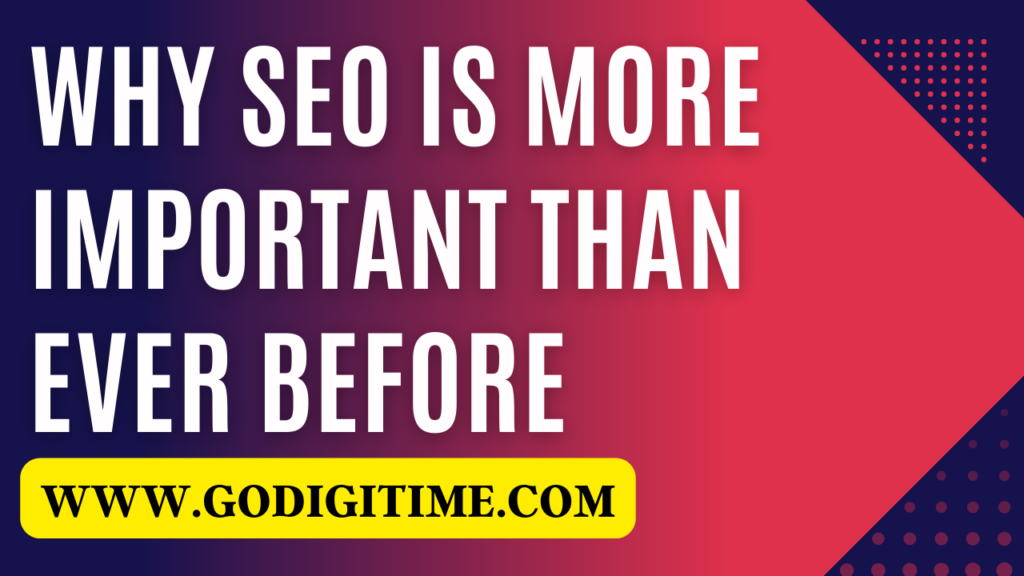
Definition of SEO
SEO encompasses a range of strategies that involve optimizing website content to make it more search engine-friendly. This includes keyword research, on-page optimization, link building, and other many factors that help search engines understand what is your website related to.
Creating a Strong Online Presence
A stronger online presence increases the chance to reach a targeted audience. By optimizing your website for search engines, you can improve its visibility and attract more visitors. This can help establish your brand as an authority in your industry and build trust with potential customers.
Improved Website Traffic and User Engagement
SEO can drive more traffic to your website, which can lead to increased user engagement. This includes longer visit durations, lower bounce rates, and more page views. These metrics can help indicate the quality of your website and help search engines understand how useful your content is for users.
Increased Lead Generation and Sales
SEO can also drive leads and sales for businesses by attracting potential customers who are searching for products or services that you offer. By optimizing your website for the right keywords and improving your user experience, you can attract visitors who are more likely to convert into leads or customers.
Cost-effective Advertising
Compared to traditional advertising methods, SEO can be a budget-friendly way to reach your target audience. Once your website is optimized for search engines, you can attract new customers without having to spend money on advertising. While SEO does require an investment of time and resources, it can offer a great return on investment over time.
Establishing Credibility and Trust
By ranking high in search engine results, your website can establish credibility and trust with potential customers. This can help you attract more qualified leads and build relationships with customers who are more likely to become repeat buyers.
Evolution of SEO
As search engines have become more sophisticated over time, SEO has evolved to keep up. Some of the most significant advances in SEO include:
Introduction of Search Algorithms
Search algorithms are the algorithms that determine which websites rank highest in search results. Google updates its algorithm thousands of times per year, which means that SEO is a constantly changing landscape.
Advancements in Voice Search and Artificial Intelligence
As voice search and artificial intelligence become more prevalent, SEO must also evolve to keep up. This includes optimizing for conversational and natural language queries, and understanding how voice assistants like Siri and Alexa work.
Mobile Optimization
With more and more users accessing the internet on mobile devices, mobile optimization has become essential for businesses that want to rank well in search engine results. This includes optimizing for mobile-friendly websites, fast loading times, and improving the user experience on mobile devices.
Local SEO
For businesses with a physical location, local SEO can be an especially effective way to attract nearby customers. This includes optimizing for local keywords, creating Google My Business listings, and other factors that can help search engines understand your business’s location.
User Experience and Technical SEO
Improving the user experience and following technical SEO best practices can help your website rank higher in search engine results. This includes factors like site speed, security, and structured data.
Future of SEO
As SEO continues to evolve, businesses must adapt to changes and stay up-to-date with the latest trends. Some of the key trends to watch for include:
Predictions for Future SEO Trends
The future of SEO will likely involve more focus on user experience, mobile optimization, and voice search. It’s also likely that Google will place more emphasis on local search results, and that artificial intelligence will become an even more important factor in ranking high in search results.
Impact of Emerging Technologies
Emerging technologies like artificial intelligence and machine learning will likely play an important role in the future of SEO. Businesses that can adapt to these changes and their advantage can gain a competitive edge over those that don’t.
Importance of Data-driven Insights
As SEO becomes more complex, data-driven insights will become even more important for businesses that want to succeed. By using analytics tools to track the impact of their SEO efforts, businesses can make more informed decisions and optimize their strategies over time.
Best Practices for SEO
To achieve SEO success, businesses should follow a range of best practices, including:
Keyword Research and Implementation
Keyword research is an essential part of any SEO strategy. By understanding which keywords your target audience is searching for, you can optimize your website content to meet their needs and attract more visitors.
High-Quality Content Creation
Creating high-quality content that provides value to your visitors is essential for ranking well in search results. This includes creating informative blog posts, videos, and other content formats that help answer your target audience’s questions.
On-page Optimization
On-page optimization includes optimizing your page titles, meta descriptions, and other on-page elements to make them more search engine-friendly and relevant to your target audience.
Link Building and Backlinking
Link building is another essential part of SEO. By creating high-quality content that other websites link to, you can improve your website’s authority and attract more visitors.
Social Media and Online Reputation Management
Social media and online reputation management can also play a role in SEO success. By creating a strong presence on social media and managing your online reputation, you can attract more visitors and improve your website’s credibility.
Common SEO Mistakes
While following best practices is essential for SEO success, there are also some common mistakes that businesses should avoid, including:
Overstuffing Keywords
Overstuffing keywords can harm your website’s ranking and make it less appealing to visitors. Instead, focus on creating high-quality content that meets your target audience’s needs.
Ignoring User Experience
Ignoring user experience can harm your website’s ranking and drive visitors away. Make sure your website is easy to navigate, loads quickly, and provides a positive user experience.
Poor Website Structure and Design
Poor website structure and design can also harm your website’s ranking and make it less appealing to visitors. Make sure your website has a clear structure and is easy to navigate.
Neglecting Mobile Optimization
Neglecting mobile optimization can harm your website’s ranking and make it less accessible to visitors. Make sure your website is mobile-friendly and loads quickly on mobile devices.
Lack of Analytics and Tracking
A lack of analytics and tracking can make it difficult to understand how your SEO efforts are impacting your website. Make sure you’re using analytics tools to track your website’s performance over time.
Importance of Analytics and Tracking
Analytics and tracking are essential for understanding the impact of SEO efforts and making informed decisions about how to optimize your strategies. By monitoring your website traffic and user behavior, you can identify areas for improvement and make changes that help your website rank higher in search results.
The Top SEO Tools
There are several SEO tools that can help businesses achieve success, including:
Google Analytics
Google Analytics is a free analytics tool that helps businesses track website traffic, user behavior, and other key metrics. It can help businesses understand how their SEO efforts are impacting their website’s performance.
Moz Pro
Moz Pro is an all-in-one SEO tool that helps businesses with everything from keyword research to on-page optimization. It provides businesses with a range of insights and recommendations to help them improve their SEO strategies.
SEMrush
SEMrush is another all-in-one SEO tool that helps businesses with keyword research, on-page optimization, link building, and more. It also provides businesses with competitor analysis and other insights to help them stay ahead of the competition.
Ahrefs
Ahrefs is an SEO tool that specializes in backlink analysis. It helps businesses understand which websites are linking to their website and provides recommendations and insights to help them improve their backlink strategy.
Yoast SEO
Yoast SEO is a plugin for WordPress that helps businesses optimize their website for search engines. It provides recommendations for on-page optimization, including meta descriptions, page titles, and other on-page elements.
Black Hat vs White Hat SEO
When it comes to SEO, it’s important to stay within ethical guidelines and avoid strategies that can harm your website’s ranking. Here’s a brief overview of black hat vs white hat SEO strategies:
Explanation of Black Hat and White Hat SEO Strategies
Black hat SEO strategies involve using deceptive tactics to rank higher in search results, while white hat SEO strategies involve ethical strategies and best practices that follow search engine guidelines.
Risks Associated with Black Hat SEO
Black hat SEO strategies can harm your website’s ranking and even get your website penalized or banned from search engines. It’s important to avoid these strategies and instead focus on ethical SEO practices.
Importance of Staying Within Ethical Guidelines
By staying within ethical guidelines, businesses can avoid the risks associated with black hat SEO and build a stronger, more sustainable online presence over time.
Benefits of SEO for Small Businesses
For small businesses, SEO can provide a range of benefits, including:
Competing with Larger Companies
SEO can level the playing field for small businesses that want to compete with larger companies. By ranking high in search results, small businesses can attract more visitors and build brand awareness.
Building Brand Awareness and Reputation
SEO can help small businesses build brand awareness and establish themselves as authorities in their industries. This can help attract more customers and build trust with potential buyers.
Generating Leads and Driving Sales
SEO can also help small businesses generate leads and drive sales. By attracting more visitors to their website, small businesses can increase their chances of converting them into leads or customers.
Cost-effective Advertising
SEO can be a cost-effective way for small businesses to reach their target audiences. Once their website is optimized for search engines, they can attract new customers without having to spend money on advertising.
SEO for E-commerce Websites
For e-commerce websites, SEO can play a critical role in driving sales and attracting customers. Here are some best practices for optimizing e-commerce websites:
Importance of SEO in the E-commerce Industry
SEO is especially important for e-commerce websites, which rely on attracting visitors and driving sales to be successful. By optimizing product pages and improving the user experience, e-commerce websites can attract more customers and generate more sales.
Best Practices for Optimizing Product Pages
Optimizing product pages includes optimizing for the right keywords, writing compelling product descriptions, and using high-quality images and videos to showcase products.
The Impact of Reviews and Ratings
Reviews and ratings can also play a significant role in e-commerce SEO. By encouraging customers to leave reviews and ratings, e-commerce websites can improve their credibility and attract more visitors.
Measuring Success with SEO
To truly understand the impact of SEO efforts, businesses must define success metrics and track their progress over time. Here are some factors to consider when measuring success:
Defining Success Metrics
Success metrics might include website traffic, time on site, bounce rates, lead generation, or overall sales. By defining these metrics, businesses can set clear goals for their SEO efforts.
Understanding ROI
Return on investment (ROI) is also an important factor to consider when measuring success. By understanding the ROI of their SEO efforts, businesses can make data-driven decisions about where to focus their resources.
Importance of Ongoing Optimization
SEO is not a one-time effort; it requires ongoing optimization to be successful. By continually monitoring their website’s performance and making data-driven decisions, businesses can stay ahead of the competition and achieve SEO success.
